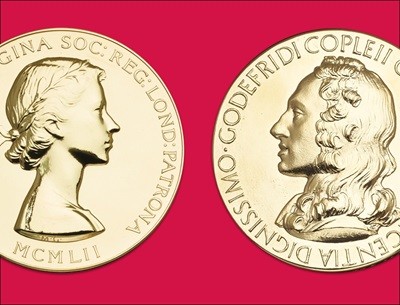Royal Society announces 2018 award winners

The Royal Society has announced the winners of its 2018–19 medals and awards — 24 prizes that recognise exceptional researchers who make outstanding contributions to science.
“The Royal Society has a longstanding tradition of identifying and celebrating the best and brightest scientists,” said Brian Foster, Vice President of the Royal Society. “The winners of this year’s medals and awards have all made outstanding contributions to their field. I congratulate them for their distinguished work and their contribution to the advancement of science as a whole.”
The Royal Medals are one of the Royal Society’s premier awards, having been awarded annually since 1825, and are made on behalf of the Queen. Stephen Sparks received a Royal Medal for his contributions to our understanding of volcanoes, including evaluating their risks and mitigating their hazards.
Also receiving the Royal Medal is Lewis Wolpert CBE for his research on morphogenesis and pattern formation that led to the concept of positional information in embryonic development — work that has enabled us to understand how cells do the right thing in the right place as an embryo grows. Shankar Balasubramanian and David Klenerman were jointly awarded the third and final Royal Medal for their co-development of DNA sequencing techniques transforming biology and genomic medicine.
The Croonian Medal and Lecture was awarded to Kay Davies DBE for her achievements in developing a prenatal test for Duchenne muscular dystrophy — a progressive muscle wasting disease which affects mostly boys — and for her work characterising the binding partners of the protein dystrophin. Her work has resulted in treatments poised to transform the lives of an estimate 250,000 patients worldwide.
Edward Hinds was awarded the Bakerian Medal and Lecture for his achievements in controlling individual atoms, molecules and photons. Hinds’ research has focused on how to use quantum systems to make the most sensitive measuring devices possible, and how to use these devices to investigate the nature of quantum systems more deeply.
The Sylvester Medal was awarded to Dusa McDuff for her pioneering role in the development of the new field of symplectic geometry and topology. Her work includes many fundamental theorems and she has been inspirational for generations of mathematicians.
Emma Chapman, a member of campaign organisation The 1752 Group, was awarded the Royal Society Athena Prize 2018 in the individual category for driving nationally impactful policy changes concerning sexual harassment issues in higher education. The Communications team at the Academy of Medical Sciences also received the prize in the team category for their program increasing the visibility and participation of female scientists in the media.
The Rosalind Franklin Award is awarded annually to those who raise the profile of women in STEM in their host institution and/or field of expertise in the UK. This year it goes to Tamsin Mather, Professor of Earth Science at the University of Oxford, for her work in the field of volcanology. Mather’s research explores the diverse ways in which volcanoes interact with Earth’s environment, the processes driving volcanic unrest and eruptions processes, as well as the hazards they pose.
All medallists and award winners will be celebrated at the Royal Society’s Anniversary Day in November 2018. The full list of award recipients can be found at the society’s website.
Professor Tony Haymet appointed Australia's Chief Scientist
Emeritus Professor Tony Haymet — a world-leading oceanographer, chemist and entrepreneur...
NZ announces significant reforms to science sector
The reforms are intended to maximise the value of the $1.2 billion in government funding that...
Vaxxas to advance its microarray patches for COVID vaccination
Vaxxas will receive AU$3.2m from BARDA to accelerate work advancing its high-density microarray...




